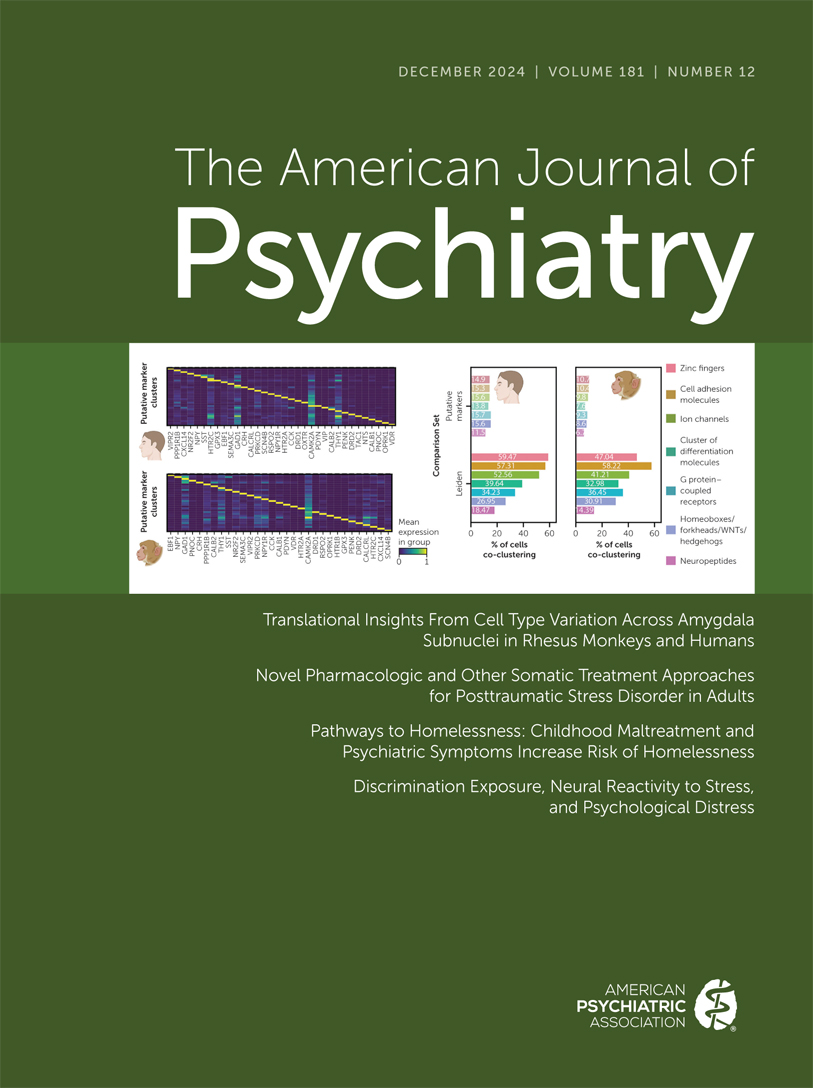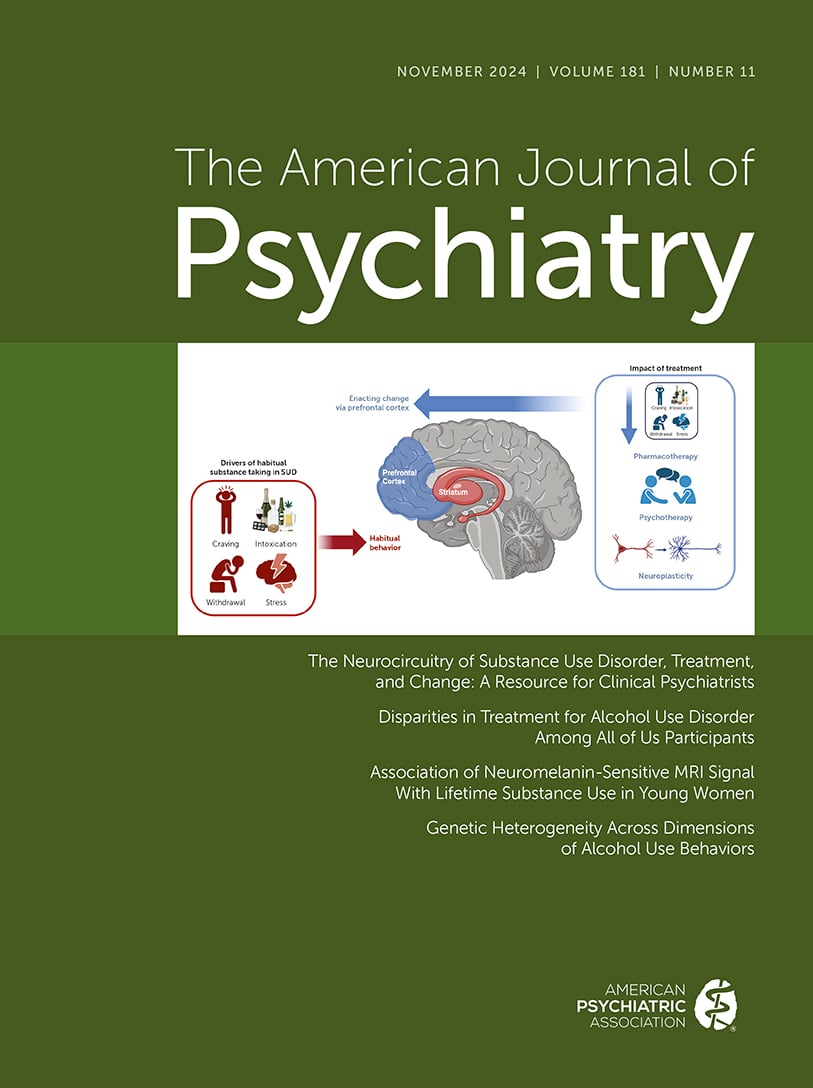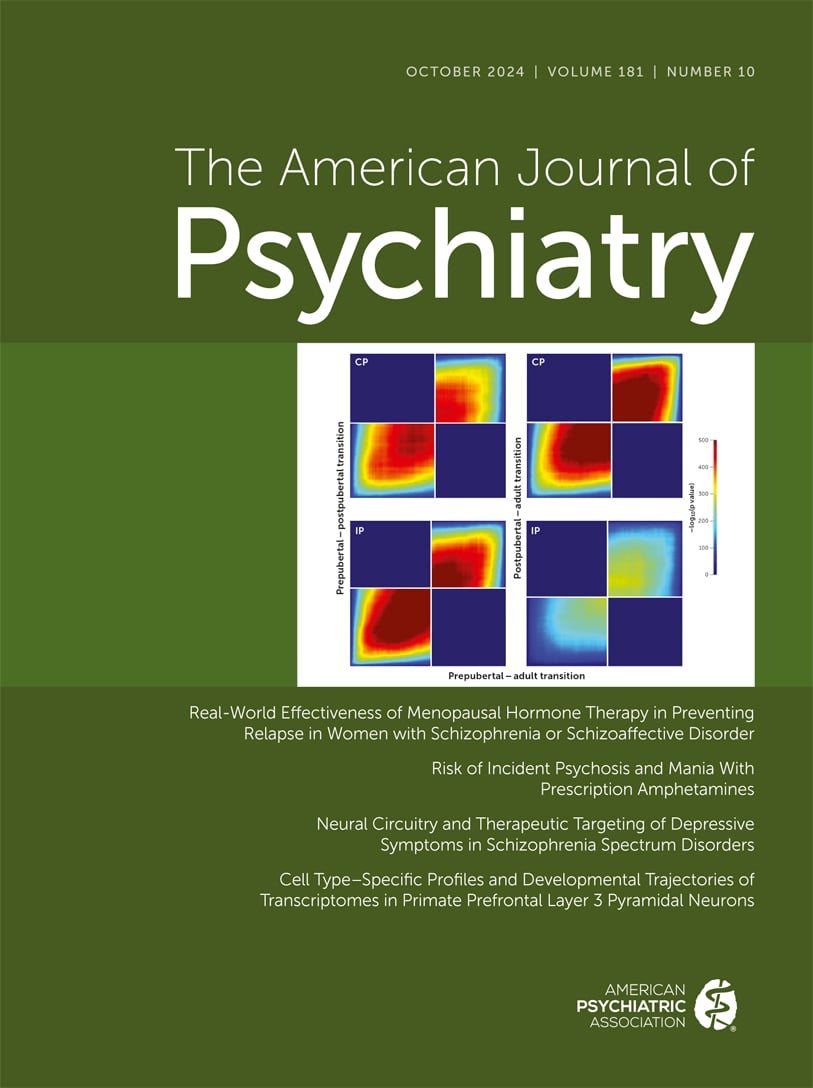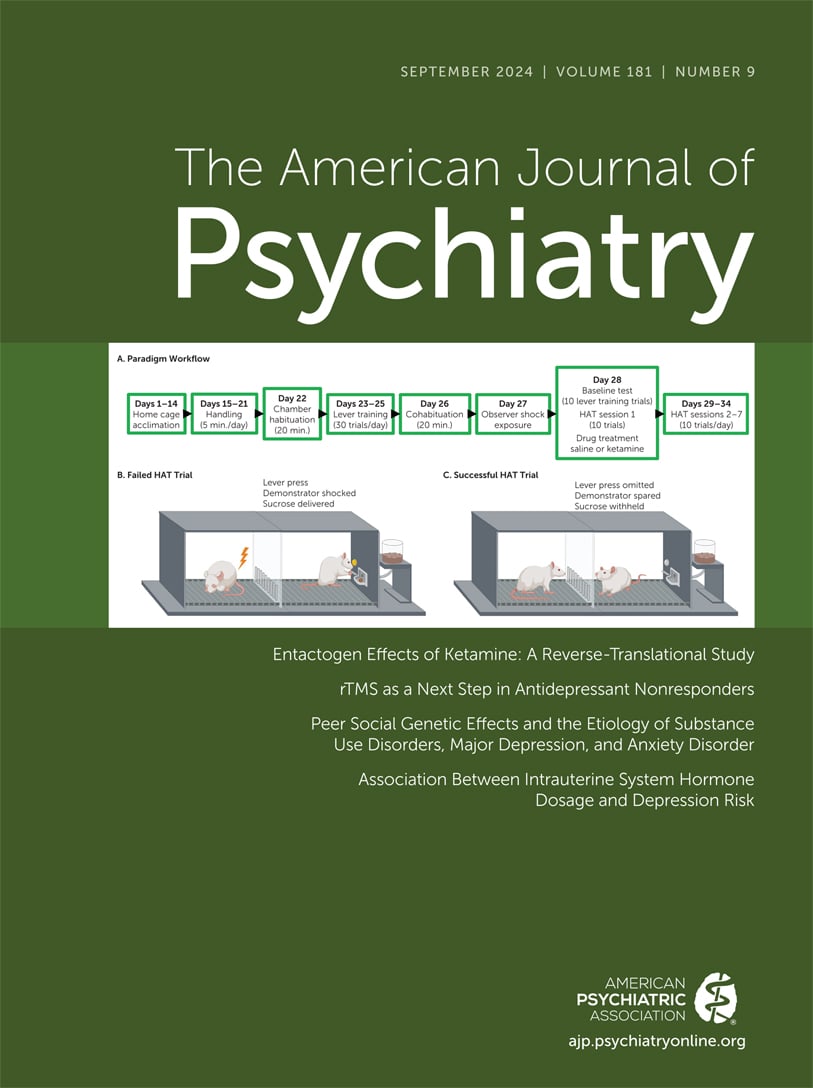American Journal of Psychiatry
- Volume 151
- Number 2
- February 1994
Publication date: 01 February 1994
Pages169–176OBJECTIVE: The most common indication for electroconvulsive therapy (ECT) is major depression. It is less recognized that ECT is effective also in the treatment of acute mania. This article aims to provide a comprehensive and critical review of the ...
https://doi.org/10.1176/ajp.151.2.169Publication date: 01 February 1994
Pages178–183OBJECTIVE: To differentiate withdrawal-related abnormalities in brain glucose metabolism among alcoholics from abnormalities that may be irreversible or antedate alcohol use, the authors evaluated metabolic recovery during alcohol detoxification. METHOD: ...
https://doi.org/10.1176/ajp.151.2.178Publication date: 01 February 1994
Pages184–189OBJECTIVE: As part of a search for measurable attributes of an individual that might be related to the risk of alcoholism, the author's group previously compared 227 sons of alcoholics and 227 matched comparison subjects at the age of about 20 years. ...
https://doi.org/10.1176/ajp.151.2.184Publication date: 01 February 1994
Pages190–194OBJECTIVE: The efficacy of short-term psychotherapy has become an area of increasing interest. The primary objective of this study was to assess the results of two forms of short-term psychotherapy in patients with personality disorders. METHOD: Eighty-...
https://doi.org/10.1176/ajp.151.2.190Publication date: 01 February 1994
Pages195–198OBJECTIVE: The authors examined the relationships among depression severity, melancholia, and cortisol level and the relationship between temperament, as measured with the Tridimensional Personality Questionnaire, and cortisol level. METHOD: Morning and ...
https://doi.org/10.1176/ajp.151.2.195Publication date: 01 February 1994
Pages199–204OBJECTIVE: This study used the concept of diagnostic stability to examine the validity of three subtypes of major depression. METHOD: Patients with major depressive disorder (N = 424) were assigned baseline diagnoses according to structured interviews and ...
https://doi.org/10.1176/ajp.151.2.199Symptom differences in major depression, dysthymia, panic disorder, and generalized anxiety disorder
Publication date: 01 February 1994
Pages205–209OBJECTIVE: The authors compared symptom features of specific subtypes of depressive and anxiety disorders. METHODS: Psychiatric outpatients with moderate levels of psychopathology and DSM-III diagnoses of major depression, dysthymia, panic disorder, or ...
https://doi.org/10.1176/ajp.151.2.205Publication date: 01 February 1994
Pages210–215OBJECTIVE: The authors analyzed data from a family sample ascertained for a genetic linkage study of bipolar disorder to address the following questions: Do the major clinical subtypes of familial affective disorder have distinct distributions of age at ...
https://doi.org/10.1176/ajp.151.2.210Publication date: 01 February 1994
Pages216–220OBJECTIVE: The authors' goal was to establish, in a large multicenter sample of patients classified according to gender and menopausal status, if the growth hormone (GH) response to clonidine discriminated patients with episodes of major depression from ...
https://doi.org/10.1176/ajp.151.2.216Publication date: 01 February 1994
Pages221–227OBJECTIVE: Chronic mentally ill adults have been found to be at risk for HIV infection. The authors investigated the prevalence of HIV risk behaviors among psychiatric outpatients. Correlates of HIV risk factors and characteristics of patient ...
https://doi.org/10.1176/ajp.151.2.221Publication date: 01 February 1994
Pages228–232OBJECTIVE: This study sought to determine the frequency and types of sexual behavior among patients with schizophrenia and to assess the behavior with respect to risk of HIV infection. METHOD: Ninety-five inpatients and outpatients with a research ...
https://doi.org/10.1176/ajp.151.2.228Publication date: 01 February 1994
Pages233–236OBJECTIVE: The authors studied the lifetime, initial cross-sectional, and 6-month follow-up prevalence of mood disorders in asymptomatic HIV- infected and uninfected homosexual men who lived in an area with a low prevalence of HIV. They also determined ...
https://doi.org/10.1176/ajp.151.2.233Publication date: 01 February 1994
Pages237–242OBJECTIVE: Psychosis is an uncommon but serious complication of infection with HIV. This article presents the results of a study of HIV- infected individuals with psychosis. METHOD: The authors evaluated 20 HIV-infected men who had noniatrogenic new-onset ...
https://doi.org/10.1176/ajp.151.2.237Publication date: 01 February 1994
Pages243–248OBJECTIVE: This study was designed to assess central serotonergic (5- HT) function in aggressive and nonaggressive boys with attention deficit hyperactivity disorder. METHOD: Prolactin response to a challenge dose of the 5-HT agonist d,l-fenfluramine was ...
https://doi.org/10.1176/ajp.151.2.243Publication date: 01 February 1994
Pages249–253OBJECTIVE: The purpose of this study was to test the reliability and validity of a new assessment instrument for positive and negative symptoms in severely disturbed children and adolescents (Kiddie-PANSS). METHOD: The Positive and Negative Syndrome Scale ...
https://doi.org/10.1176/ajp.151.2.249Publication date: 01 February 1994
Pages254–259OBJECTIVE: Relationships between day hospital treatment goals, self- help group participation, and substance use outcome were examined for 180 alcohol- or cocaine-dependent male patients in a day hospital Veterans Administration substance abuse program. ...
https://doi.org/10.1176/ajp.151.2.254Article
Publication date: 01 February 1994
Pages261–263Eleven panic disorder patients who panicked in response to exogenous cholecystokinin tetrapeptide (CCK-4) were rechallenged after chronic treatment with imipramine. In the rechallenge the patients displayed a marked reduction in the number and intensity ...
https://doi.org/10.1176/ajp.151.2.261Publication date: 01 February 1994
Pages264–266The authors compared the maximal duration of voluntary breath-holding in patients with panic disorder (N = 23), patients with generalized social phobia (N = 10), and healthy subjects (N = 26). Patients with panic disorder had significantly shorter breath-...
https://doi.org/10.1176/ajp.151.2.264Publication date: 01 February 1994
Pages267–270Among 23 patients with Alzheimer's disease, 11 (48%) exhibited cortisol hypersecretion (> or = 11.8 micrograms/dl) and nine (39%) displayed cortisol nonsuppression on the dexamethasone suppression test. Only four patients exhibited both neuroendocrine ...
https://doi.org/10.1176/ajp.151.2.267Publication date: 01 February 1994
Pages271–273The effects of acute gonadal suppression on sexual function and behavior were studied in eight normal men. Administration of a newly developed, potent gonadotropin-releasing hormone antagonist induced azoospermia and reduced levels of serum testosterone, ...
https://doi.org/10.1176/ajp.151.2.271Publication date: 01 February 1994
Pages274–276The authors investigated the relationship between Cloninger's personality dimensions and DSM-III-R personality traits by comparison of scores on the Tridimensional Personality Questionnaire with axis II traits found in structured interviews with 99 ...
https://doi.org/10.1176/ajp.151.2.274Publication date: 01 February 1994
Pages277–280Twelve patients with borderline personality disorder and 15 healthy comparison subjects were challenged with single doses of oral m- chlorophenylpiperazine (m-CPP) and placebo. Following m-CPP, the patients experienced decreased anger and fear. Seven of ...
https://doi.org/10.1176/ajp.151.2.277Article
Article
Article
Article
Article
Publication date: 01 February 1994
Pages300-a–300In the letter "An Interaction of Sertraline and Desipramine" by Jorge Barros, M.D., et al. (November 1993, p. 1751), the last paragraph should indicate that sertraline increased desipramine levels in their patient by 150% (not 250%) at the end of week 2.
https://doi.org/10.1176/ajp.151.2.300-aPast Issues
View Issues Archive
Vol. 181 | No. 12

Vol. 181 | No. 11

Vol. 181 | No. 10
